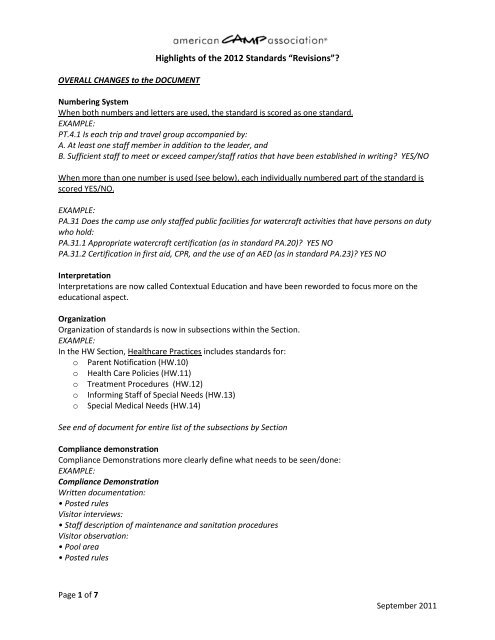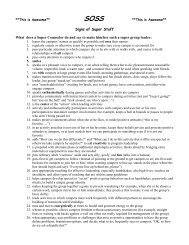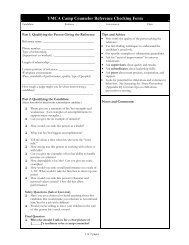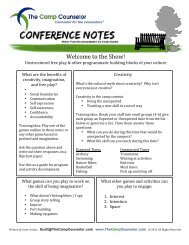Highlights - American Camp Association, New England
Highlights - American Camp Association, New England
Highlights - American Camp Association, New England
You also want an ePaper? Increase the reach of your titles
YUMPU automatically turns print PDFs into web optimized ePapers that Google loves.
OVERALL CHANGES to the DOCUMENT<br />
<strong>Highlights</strong> of the 2012 Standards “Revisions”?<br />
Numbering System<br />
When both numbers and letters are used, the standard is scored as one standard.<br />
EXAMPLE:<br />
PT.4.1 Is each trip and travel group accompanied by:<br />
A. At least one staff member in addition to the leader, and<br />
B. Sufficient staff to meet or exceed camper/staff ratios that have been established in writing? YES/NO<br />
When more than one number is used (see below), each individually numbered part of the standard is<br />
scored YES/NO.<br />
EXAMPLE:<br />
PA.31 Does the camp use only staffed public facilities for watercraft activities that have persons on duty<br />
who hold:<br />
PA.31.1 Appropriate watercraft certification (as in standard PA.20)? YES NO<br />
PA.31.2 Certification in first aid, CPR, and the use of an AED (as in standard PA.23)? YES NO<br />
Interpretation<br />
Interpretations are now called Contextual Education and have been reworded to focus more on the<br />
educational aspect.<br />
Organization<br />
Organization of standards is now in subsections within the Section.<br />
EXAMPLE:<br />
In the HW Section, Healthcare Practices includes standards for:<br />
o Parent Notification (HW.10)<br />
o Health Care Policies (HW.11)<br />
o Treatment Procedures (HW.12)<br />
o Informing Staff of Special Needs (HW.13)<br />
o Special Medical Needs (HW.14)<br />
See end of document for entire list of the subsections by Section<br />
Compliance demonstration<br />
Compliance Demonstrations more clearly define what needs to be seen/done:<br />
EXAMPLE:<br />
Compliance Demonstration<br />
Written documentation:<br />
• Posted rules<br />
Visitor interviews:<br />
• Staff description of maintenance and sanitation procedures<br />
Visitor observation:<br />
• Pool area<br />
• Posted rules<br />
Page 1 of 7<br />
September 2011
User Groups<br />
User Groups are now referred to as Rental Groups. (<strong>Camp</strong>s serving rental groups.)<br />
CHANGES BY SECTIONS<br />
For chart containing Old/<strong>New</strong> Numbers, synopsis of changes, and complete list of standards by<br />
Sections/Subsections see: Summary of Changes available at<br />
www.acacamps.org/accreditation/resources-tools<br />
Site and Food Service (SF)<br />
Old SF-18 Hot Water Controls. Deleted<br />
Old SF-21 Garbage Cans. Deleted<br />
Old SF-7 Maintenance Program is included in <strong>New</strong> SF.7 Condition of Facilities.<br />
Old SF-8 Facilities in Good Repair is now SF.7 Condition of Facilities.<br />
Old SF-10 Clean <strong>Camp</strong> Site now included in new SF.7 Condition of Facilities.<br />
Old SF-14 Carbon Monoxide Detectors are now included in SF.11 Smoke and Carbon Monoxide<br />
Detectors.<br />
Transportation (TR)<br />
Old TR-6 Removed the requirement about availability and location of health information and permission<br />
to treat. Availability of this information is addressed, in PD.10 Emergency Information and PT.9 Trip<br />
Documentation and Emergency Information.<br />
Old TR-8 Bus/Van Supervisor is now covered in TR.6 Supervision.<br />
Old TR-18 Does the camp provide training for camp drivers that includes instructions for:<br />
A. Behind-the-wheel-driving when vehicle to be driven differs in size/capacity from the drivers’ regularly<br />
driven vehicle is now included in TR.15 Training for Drivers.<br />
Old TR-9/<strong>New</strong> TR.8 Safety Procedures. The following has been added: <strong>Camp</strong> must have: A list of<br />
individuals on each trip be readily available either in the vehicle(s) or at the camp office.<br />
Old TR-16/<strong>New</strong> TR.14 Driver Requirements. Now provided with an option to DNA if driver ONLY uses a<br />
golf cart.<br />
TR.12 and TR.13, which would be DNA’d if the camp does not provide charter vehicles with hired drivers<br />
are in different Sub Sections from TR.14 – TR.16.<br />
Health and Wellness (HW)<br />
Old/<strong>New</strong> HW.6 Health Exams. Health exams for campers/staff are now only required when the camp<br />
determines it is necessary based on program offerings and camper population: Has the camp<br />
assessed and made a determination regarding the need for campers to have a physical exam by an<br />
appropriately licensed medical provider within six (6) months of attending camp?<br />
Health Information for staff now included in Standards HW.23 though HW.25 (separate standards from<br />
camper information).<br />
Page 2 of 7<br />
September 2011
o<br />
o<br />
o<br />
HW.23 Staff Health History (includes contact information and permission to treat).<br />
HW.24 Health Screening for Resident <strong>Camp</strong> Staff.<br />
HW.25 Contact Information for Staff Members Who Are Minors.<br />
Old/<strong>New</strong> HW.15 Health Center. Removed requirement for lockable storage system for medication. It is<br />
now included in HW.19 Medication Administration: All drugs to be stored under lock except when in<br />
the controlled possession of the person responsible for administering them.<br />
Old HW-20/<strong>New</strong> HW.19 Medication Administration. Added lockable storage requirement to this<br />
standard.<br />
Old HW-3/<strong>New</strong> HW.11 Healthcare Policies and Procedures. No longer asks about on-site and off-site<br />
healthcare, provisions of equipment, obtaining emergency healthcare assistance, health screening,<br />
medication management, monitoring sanitation in camp and seasonal and long-term recordkeeping,<br />
as those topics are addressed elsewhere in the standards.<br />
Old HW-4 Healthcare Policy Review. Deleted and now incorporated in HW.11 Healthcare Policy. A<br />
signature is also required on the review: Are healthcare policies and/or procedures for each type of<br />
camp operation reviewed and signed: At least every three (3) years by a licensed healthcare professional<br />
whose scope of practice allows such a review?<br />
Old/<strong>New</strong>/HW.12 Treatment Procedures. Significant rewording: Does the camp utilize treatment<br />
procedures allowed under the scope of practice of the designated healthcare provider(s) for dealing<br />
with reasonably anticipated illnesses and injuries?<br />
The Contextual Education of this standard notes that a signature may be required based on the scope of<br />
practice of the individual for which the treatment procedures are written. This statement is in there<br />
specifically for the EDUCATION and is not to be scored. We will be sharing additional resources<br />
regarding HW.12 and HW.13 on the website.<br />
EXAMPLE:<br />
An RN would need to follow signed Treatment Procedures. Someone with Wilderness First Aid, following<br />
the text book used for the course would not need signed procedures.<br />
Old HW-1, <strong>New</strong> HW.2 First Aid and Emergency Health Care Personnel. Option for Level 2 provider<br />
eliminated as the first aid course(s) that fit that criteria are no longer widely available. <strong>New</strong> standard<br />
reads: Does the camp require adults with the following minimum qualifications to be on duty at all times<br />
when campers are present:<br />
HW.2.1 When access to the emergency medical system (EMS) is 30 minutes or less, certification by a<br />
nationally recognized provider of training in first aid and CPR/AED (cardiopulmonary<br />
resuscitation and the use of an automated external defibrillator)?<br />
HW.2.2 When access to emergency rescue systems or EMS is more than 30 minutes, certification<br />
from a nationally recognized provider of training in wilderness first aid and CPR/AED?<br />
Operational Management (OM)<br />
Old OM-1 Review of Foundational Practices. Deleted. The Foundational Practices are included as a<br />
resource in the 2012 APG but are not a scored part of the standards.<br />
Old OM-5 Assessment of Standards Compliance. Deleted. The need for a camp to assess their<br />
compliance with the standards on an annual basis will be included in the Annual Statement of<br />
Compliance in a more clear/concise statement.<br />
Page 3 of 7<br />
September 2011
Old OM-11 Smoking Policies. Deleted.<br />
Old OM-12 Staff Emergency Training is now included in OM.8 Emergency Plan and Rehearsal.<br />
Does the camp have and rehearse a plan to respond appropriately to natural disasters and other<br />
reasonably foreseeable emergencies, a plan that addresses what to do in case of emergency, and<br />
includes building and site evacuation procedures?<br />
Old OM-9/<strong>New</strong> OM.3 Insurance Coverage. Fire and extended risk coverage on buildings has been<br />
changed to: At a minimum, coverage for basic causes of loss on buildings. Also, business personal<br />
property coverage (contents) has been added to the list of required insurances.<br />
Old OM 2/<strong>New</strong> OM.6 Firearms Control. The standard now specifies that OM.6 is scored for firearms not<br />
used in programming. Firearms used in programming are scored in PD.26 Rifle, Pellet Gun, and Air Gun<br />
Safety: For all firearms not used in programming, does the camp require that firearms and ammunition<br />
be stored under lock when not in use?<br />
Old OM 10/<strong>New</strong> OM.4 Personal Property. Vehicles driven by campers are addressed in the Contextual<br />
Education.<br />
Human Resources (HR)<br />
Old/<strong>New</strong> HR.1 Director Qualifications.<br />
Requirement for Bachelor’s degree deleted.<br />
Requirement for Professional Development now states: An average of five (5) hours per year of<br />
professional development that addresses the individual’s needs related to the ACA core<br />
competencies.<br />
Requires written documentation to verify experience. (For the private camp owner, this might<br />
be a copy of what is posted on their website).<br />
Old/<strong>New</strong> HR.2 Special Needs Staff Requirements. Requirement for staff working with special needs<br />
population has been revised: Do at least 25 percent of the day and resident camp administrative and<br />
program personnel with staff supervisory responsibilities have a bachelor's degree in an area relevant to<br />
the clientele served, or at least sixteen (16) weeks of experience working with special needs populations?<br />
Old/<strong>New</strong> HR.3 Staff Screening. Requirement for year-round screening revised to state: Does the camp<br />
have written hiring policies that: Define additional/periodic screening requirements for year-round staff<br />
beyond the new-hire period (HR.5) and annual screening process stated in HR.4, consistent with their role<br />
and relationship with campers?<br />
Old HR-4 Staff Screening/<strong>New</strong> HR.4 and HR.5.<br />
Mandatory annual screening for all staff is included in HR.4 Annual Staff Screening:<br />
Does the camp require annual screening for all camp staff — paid, volunteer, and contracted —<br />
with responsibility for or access to campers that includes:<br />
o HR.4.1 A voluntary disclosure statement?<br />
o HR.4.2 A check of the National Sex Offender Public Website?<br />
As stated in the glossary, all staff includes YEAR-ROUND staff as well as seasonal employees, plus as<br />
stated above.<br />
Screening for NEW staff now included in HR.5 <strong>New</strong> Staff Screening:<br />
Does the camp require screening for all new camp staff with responsibility for or access to<br />
campers that includes:<br />
o HR.5.1 A criminal background check for staff eighteen years of age and older?<br />
Page 4 of 7<br />
September 2011
o<br />
o<br />
HR.5.2 At least two reference checks and verification of previous work (including volunteer)<br />
history?<br />
HR.5.3 A personal interview by the camp director or a designated representative?<br />
Old HR-5A Diversity. Deleted: Does the camp’s staff recruitment process include procedures to recruit<br />
program and administrative staff whose racial or ethnic diversity reflects that of the camper population<br />
served? While ACA feels diversity of all types is essential to include in the camp community, we also feel<br />
that having a standard regarding this topic does not accomplish that goal.<br />
Old/<strong>New</strong> HR.6 Job Descriptions/Information. Now requires the job description and information be<br />
shared PRIOR to the person accepting the job vs. prior to the person starting the job. Also requires<br />
essential functions to be included in the job description:<br />
Prior to accepting a position, is each camp staff member provided with:<br />
A. Written job description that identifies the responsibilities and essential functions of the job<br />
and<br />
B. Information on the nature and diversity of the total camp population, and general<br />
characteristics of the camp and programs offered?<br />
Old HR-9 <strong>Camp</strong>er Supervision Ratio and Old HR-10 Staff Age Requirements now included in HR.8 <strong>Camp</strong>er<br />
Supervision Ratios and Staff Age and HR.9 Supervision Ratio Exceptions.<br />
Old HR-16/<strong>New</strong> HR.17 Behavior Management and Discipline. Added a separate scoreable item:<br />
HR.17.2 Help staff recognize bullying and address the need to share with campers that bullying is<br />
unacceptable and to whom incidents of bullying should be reported?<br />
Old HR-18 Supervision of Staff deleted and now included in HR.19 Supervisor Training.<br />
Does the camp provide written guidelines and specific training for supervisors to help them:<br />
o HR.19.1 Monitor performance of staff they supervise?<br />
o HR.19.2 Identify and reinforce or correct staff behavior, as appropriate?<br />
o HR.19.3 Carry out their responsibilities in the camp’s performance review system?<br />
Old HR-20/<strong>New</strong> HR.20 Staff Observation. Now requires written documentation.<br />
Program Design and Activities (PD)<br />
General<br />
NOW includes standards from the Program Adventure/Challenge and Program Horseback Riding<br />
sections.<br />
EXAMPLE:<br />
OLD PD-24/PC-15 and PH-15 Use of Helmets are now Standards PD.29 and PD.30.<br />
Program Adventure and Challenge Course activities are now considered specialized activities.<br />
Just as with archery and riflery, there are standards in the PD section that apply specifically to<br />
those activities. (A checklist has been developed to help determine what standards are scored<br />
for what activities).<br />
A fourth bullet has been added to the definition of specialized program activities:<br />
o Activities that require a specialized skill set or knowledge, such as edible plants, ice fishing,<br />
pyrotechnics, and circus stunts that occur in the air (trapeze, tightrope, etc.).<br />
Specific:<br />
Old PD-2 Outdoor Opportunities. Deleted, but somewhat included in PD.7 Environmental Activities.<br />
Old PD-3 Environmental Practices. Deleted as it is covered in PD.7 Environmental Activities.<br />
Page 5 of 7<br />
September 2011
<strong>New</strong> PD.7 Environmental Activities. Asks: Does the camp include, in each age group served in day and<br />
resident camp programs, structured activities that:<br />
A. Help campers feel comfortable in the natural environment;<br />
B. Build appreciation for and knowledge of ecological principles; and<br />
C. Develop an awareness of and responsibility for practices that have minimal impact on the<br />
environment?<br />
Old PD-9 <strong>Camp</strong>er Involvement in Program Planning. Deleted.<br />
Old PD-11/<strong>New</strong> PD.6 Activity Information and Permission. Now requires signed statement from<br />
parent/guardian: Does the camp inform campers and their parents or guardians in writing, of the nature<br />
of anticipated camp activities and require a signed statement from parents or guardians that indicates<br />
permission or denial for minors potentially participating in those activities?<br />
Old PD-15/<strong>New</strong> PD.12 Supervisor Qualifications. A time frame has been added to certifications and<br />
documented experience to provide for current learning/training: Does the camp provide an overall<br />
supervisor for each type of specialized activity who is an adult with certification, earned within past three<br />
(3) years, OR documented training and recent experience, within the past three (3) years, in that type of<br />
activity?<br />
OLD PD-19 Operating Procedures and OLD PC-5 Operating Procedures. Deleted and are now<br />
incorporated in the standards (those already in existence) that specifically address what is required in<br />
those standards<br />
<strong>New</strong> PD 4.1 Eligibility Requirements.<br />
<strong>New</strong> PD 22.1 <strong>Camp</strong>er/Staff Supervision Ratios.<br />
<strong>New</strong> PD 23.1 Safety Regulations.<br />
<strong>New</strong> PD 23.1 Emergency Procedures.<br />
<strong>New</strong> PD 8.1 Equipment and Maintenance Concerns.<br />
Old PD-25/<strong>New</strong> PD.27.1 Go-Kart Safety. Has been reworded: Does the camp require that go-karts (and<br />
similar motorized program vehicles) be equipped with rollover protection devices such as roll bars, roll<br />
hoops, or roll cages, and/or restraint devices such as seat belts or safety harnesses whenever these are<br />
applicable to the type of vehicle being used, activities being conducted, and recommended by the<br />
manufacturer?<br />
Use of additional safety equipment added to standards dealing with boarding/skating and riflery:<br />
OLD PD-7/<strong>New</strong> PD.31 Safety Apparel. Does the camp require campers and staff to wear the following<br />
safety gear and apparel, when appropriate to the activities offered:<br />
PD.31.1 For skateboarding, mountain boarding, in-line skating, roller blading, roller hockey, or ice<br />
skating: knee pads, elbow pads, and wrist guards?<br />
PD31.5: For archery, use of arm guards.<br />
PD.31.5 For firearm activities, ear and eye protection (eye protection not required for pellet guns)?<br />
Old PH-15A Rider Apparel (Use of Helmets) / <strong>New</strong> PD.30 Protective Headgear for Horseback Riding. Now<br />
includes option for campers/staff eighteen years of age and older to NOT wear a helmet when specific<br />
criteria is met. Standard is still Mandatory (both parts).<br />
During horseback riding activities, including pony rides:<br />
PD.30.1 Does the camp require staff and campers under the age of 18 to wear a helmet?<br />
Page 6 of 7<br />
September 2011
PD.30.2 For campers/staff over the age of 18, does the camp require the individual to either<br />
wear a helmet or complete an acknowledgement of risk form (legal in the state in which the<br />
camp is located) if they choose not to wear a helmet? This document must do the following:<br />
A. Inform the participant of the advantages of equestrian helmet use;<br />
B. Inform the participant of the risks associated with the choice not to wear a helmet;<br />
C. State the participant is making an informed and voluntary decision;<br />
D. Address any other facility, regulatory, legal, or liability issues; and<br />
E. Include any language as required under state equine activity liability laws?<br />
Program Aquatics (PA)<br />
Old/<strong>New</strong> PA.1 Aquatics Supervisor Qualifications. Three years has been specified as the timeframe in<br />
which someone must have “held” the appropriate certification: Certification — holds or has evidence of<br />
having held one of the following certifications within the past three (3) years.<br />
Old PA-8/<strong>New</strong> PA.11 Safety for Persons Impaired Mobility. There is no longer an option for any camp to<br />
DNA this standard. All camps should be prepared to serve individuals with impaired mobility — this<br />
standard does not only apply to individuals with special medical needs but also includes individuals who<br />
might temporarily have impaired mobility.<br />
Old PA-15/<strong>New</strong> PA.4 Lifeguard Skills. DNA when the rental group provides the lifeguard.<br />
Old/<strong>New</strong> PA.21 Watercraft Rescue Skills. DNA when the rental group provides the watercraft guard.<br />
Old/<strong>New</strong> PA.22 Watercraft Safety for All-Adult Groups. Deleted both staff and family groups from being<br />
able to use watercraft without a watercraft guard if Part B of the standard is met. This standard is now<br />
applicable only for all-adult groups. For staff, all-adult groups, does the camp require that participants<br />
are:<br />
A. Supervised by certified personnel (see standard PA.20), or<br />
B. Instructed to implement procedures that specify:<br />
1. PFDs be worn by all persons at all times,<br />
2. Safety regulations be followed, and<br />
3. A designated checkout system be used?<br />
Program Trip/Travel (PT):<br />
Old/<strong>New</strong> PT.4 Supervision Ratios. The option to have only one staff member on a trip if all campers are<br />
at least fourteen years of age has been removed:<br />
Is each trip and travel group accompanied by:<br />
A. At least one staff member in addition to the leader, and<br />
B. Sufficient staff to meet or exceed camper/staff ratios that have been established in writing?<br />
Page 7 of 7<br />
September 2011







